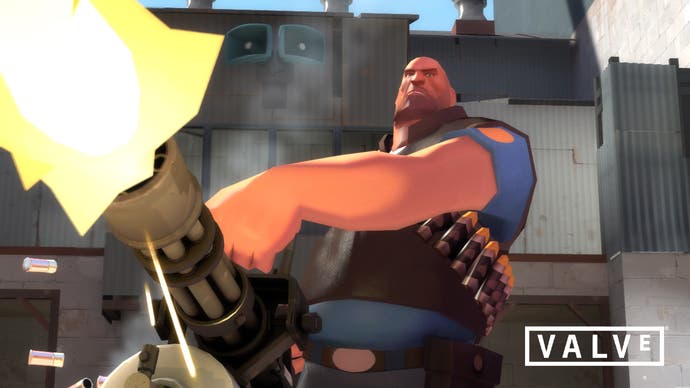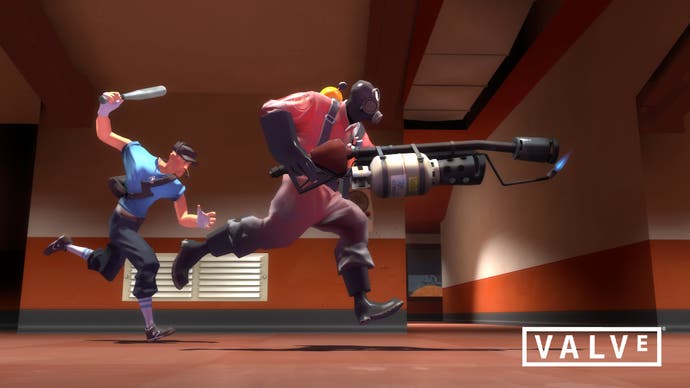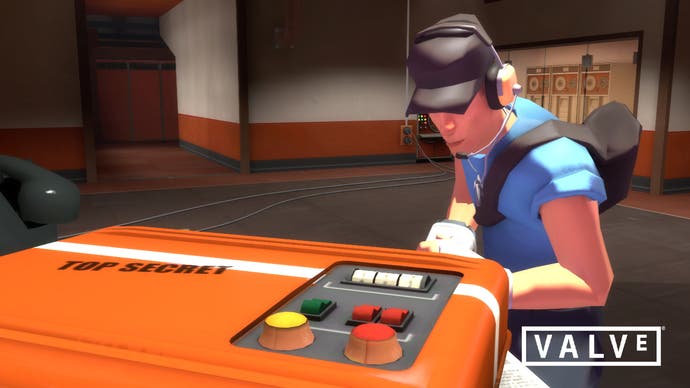Team Fortress 2
King of the castle.
Figuring out how best to fight for your team in the role you've chosen is very intuitive, but so is figuring out how to support your team, and it's all important work - the Medic, for example, is one of the easiest classes to play as in the game, but also the most important in the right hands. His "medi-gun" is useful for healing team-mates in advanced positions, but the other element of it is the ability to build up "uber-charge". This involves lots of healing and staying alive, and allows the Medic to unleash ten seconds of invulnerability for him and his target comrade. Medic-and-Heavy combinations are great for holding down capture-points, or assaulting them in more claustrophobic settings, while other combinations yield other benefits.
In contrast with other, less accessible team-based FPS games, TF2's clever concoction of classes, artistic choices and relationship trackers help you establish effective attack and defence routines almost without the need for voice communication (although it, and finger-bending voice-command menus, are present). The good thing about that instinctive adaptation is that it allows you to slot onto public servers without feeling self-conscious, but the further you progress the more likely you are to experiment with tougher classes, and the more strategic depth you uncover. The victor, in every situation, is simply the team who adapted best first. Where we perhaps expected baffling complexity, instead we've got a game that rewards mental agility, but doesn't struggle to cultivate it.

In a team-based FPS - especially one that plays at such a fast pace, where death can be frequent - that's potent. The best difference between Counter-Strike and TF2, for instance, is that failure in TF2 is often immediately instructive, and a successful tactic or an unrivalled twitch-killer are never the panacea they are in on the fields of Dust or Militia. After all, what good is the best Sniper in the world if, in sudden-death overtime, he misses the fact that his comrade on the balcony is actually a cigarette-chomping super-Spy preparing to slit his throat?
The game also does a lovely job of framing your relationship with other players and nurturing them. If someone is dominating you, the game says so, and revenge is sweeter. The scoring system, of course, helps reflect this - if someone is dominating you, they get more points for continuing to do so. Valve also includes a range of Achievements (which we witnessed on both PC and 360), that - rather like celebrated Geometry Wars 360 achievement "Pacifism" - push you in the direction of new ideas as much as they celebrate or laugh along with your accomplishments.

It is a game where even a day's worth of play could fill a website's worth of anecdotes. Standing at the top of a tower trying to avoid Demo Man rounds while Heavies mount the stairs and Spies attempt to get behind you is a science-fiction Helm's Deep. And as with another of the Orange Box games, Portal, Valve's ability to teach players without over-encumbering them, or even without giving away that they are doing so, in no way diminishes the game's long-term appeal or its bounteous variety.
As an aside, there are certain things about any multiplayer FPS game that ultimately prove critical to its acceptance that no review scenario is ever likely to convey, and it would be churlish not to recognise these in the text: we had minimal exposure to the server-side control of the game, and our experiences were limited to LAN play. We believe that the developer's pre-release period of beta-testing, its capacity to make CS work long-term, and its history of offering free and feedback-based support should mitigate potential problems, but we thought we'd mention it.

Looking beyond release, TF2 will get more maps (for free), but even the initial six will struggle to wane thanks to sheer gameplay density. TF2's been in development since B*Witched were top of the pops, and the result is a game that should scale to the needs of everyone from the clumsiest neophyte to the staunchest supporter.
In an uncharacteristic burst of intelligent observation, the game's Wikipedia entry remarks that the old design of TF2 is "quite possibly the only game to have spawned a thriving sub-genre without ever being released itself". For the people who make up that sub-genre, as well as those addressing it afresh, we're confident the reaction will be "ten years well spent".








